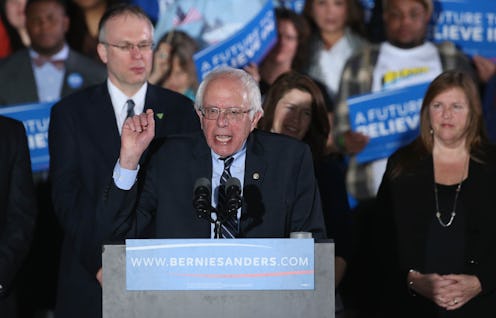News
Bernie Won Wyoming, Except In The Way That Matters
On Saturday, Vermont senator and Democratic presidential candidate Bernie Sanders had a pretty good night! Or at least, that's what you might naturally assume. Polling out of Wyoming was scarce heading into the state's Democratic caucuses, but all the factors seemed aligned for yet another Sanders victory. And when it was all said and done, that's what happened: Sanders won by 12 percent, extending his winning streak to seven states. And yet, it didn't help one bit — Bernie Sanders' Wyoming win was pretty meaningless, because as usual, it's all about the delegates.
If you've been following this race closely at all, then you probably know the situation pretty well. Despite having assembled a list of wins in state contests that looks pretty impressive if you wrote them out on a page — he's claimed 17 states total, compared to Democratic frontrunner Hillary Clinton's 20 — he's still trailing in the pledged delegate race by 219.
If he can't pull into the lead in that regard, his chances of winning the nomination are virtually nil, as Democratic superdelegates have never before thrown their support to a candidate who was trailing in pledged delegates. And to make matters worse, the Democrats award all their delegates proportionally, meaning there aren't any chances to make up big ground in a winner-take-all contest.
In other words, Sanders needs to win primaries and caucuses by large enough margins that he starts eating into Clinton's lead in a serious way. According to FiveThirtyEight, his target number for Wyoming if he were hoping to get on track for the nomination was 9 delegates — a modest total out of just 14 in the state, but one that would put him on the kind of pace he'd need to realistically overtake Clinton. But, despite winning in Wyoming by double digits, he only leaves the state with 7 delegates — that is to say, the same amount that Clinton won.
Which means the entire thing is purely a symbolic victory, really. Some might argue that it benefits Sanders by virtue of keeping his momentum going, but it's hard to argue that the word "momentum" really applies when you've just finished treading water. After Wyoming, Sanders has one less state to try to gain ground in (and one of the small caucus states he typically performs well in, no less), and he's running out of time — there are only 16 more state contests on the schedule, and 20, if you count Washington D.C., Guam, Puerto Rico, and the Virgin Islands.
One thing seems certain, however, and that's that Sanders is going to take his insurgent campaign absolutely as far as it can go — he's repeatedly stressed that he plans to be in this thing all the way to the Democratic National Convention in July, and he has more than enough money in the bank to do so. Sanders' success in fundraising largely small-dollar amounts from individual donors has been a real boon throughout the campaign, keeping him flush with cash while benefiting from the credibility boost it gives his campaign finance rhetoric, and he's well-entrenched enough to jockey for position with Clinton for months more.
But if what happened in Wyoming happens too many more times in the run of upcoming primaries — it's going to be New York next, followed by Connecticut, Delaware, Maryland, Pennsylvania, and Rhode Island — then his hopes are going to start crumbling into dust, on purely mathematical grounds. He's got until April 19 in New York to figure out how to engineer another upset in a state Clinton's projected to win.
